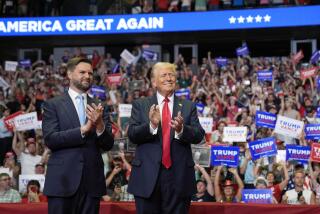U.S. Troops in Saudi Arabia
The first line of your article on disquiet in the U.S. military (front page, Dec. 5) contains the word profound . The use of that word is apposite, because your article does raise a number of issues that are profoundly important in the context of the current U.S. operations in Saudi Arabia.
I would like to comment on some issues that relate specifically to the Army:
* Within the context of the all-volunteer Army, an adequate flow of quality recruits is essential. The Army’s current recruiting goal is to have slightly fewer than 90,000 new soldiers report for service during fiscal year 1991. Results to date indicate that the Army will have little if any difficulty meeting its goal. The quality of these recruits continues to be outstanding.
292 National Guard units have been mobilized to support Operation Desert Shield. Mobilization entails a validation process, an appraisal of the training, manning and equipment status of each unit. In my judgment, the training status of National Guard and Army Reserve units that have been mobilized has been excellent.
* Reservists are not activated for duty “on an open-ended tour.” The Army’s current legal authority only enables the Army to call reservists for a maximum of 180 days. Although Congress has recently provided some exceptions to that limitation, the legislation still maintains the imposition of a finite length of service.
Finally, some officers, according to your article, apparently believe that senior civilian leaders of the armed services assume that “a large and potent military force can somehow guarantee rapid victory.” Since I am one of those leaders, I need to comment. My professional military colleagues tell me that guaranteeing anything in war would reflect a most unwise practice. However, I am even more sure that the President, Secretary of Defense Dick Cheney and Joint Chiefs of Staff Chairman Colin Powell are absolutely correct when they order me and the Army to deploy a force that is large enough in the judgment of the commander-in-chief in Saudi Arabia to deal with the threat at hand and the achievement of our national objectives.
MICHAEL P.W. STONE
Secretary of the Army
Washington, D.C.
More to Read
Sign up for Essential California
The most important California stories and recommendations in your inbox every morning.
You may occasionally receive promotional content from the Los Angeles Times.






